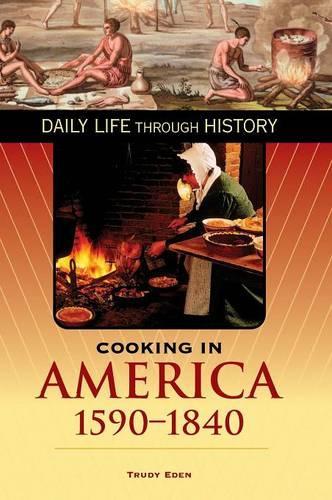
Cooking in America, 1590-1840
(Hardback)
Publishing Details
Cooking in America, 1590-1840
By (Author) Trudy Eden
Bloomsbury Publishing PLC
Greenwood Press
30th August 2006
United States
Classifications
Tertiary Education
Non Fiction
Cultural studies: customs and traditions
394.1
Physical Properties
Hardback
184
Description
There are no recipes for what the Indians ate in Colonial times, but this cookbook uses period quotations to detail what and how the foodstuffs were prepared. The bulk of the cookbook is devoted to what the European immigrants cooked and what evolved into American cooking. The first colonists from England brought their foodways to America. The basic foods that Americans of European descent ate changed very little from 1600 to 1840. While the major basic foods remained the same, their part in the total diet changed. Americans at the end of the period ate far more beef and chicken than did the first colonists. They used more milk, butter and cream. They also ate more wheat in the form of breads, cakes, cookies, crackers and cereals. The same was true with fruits. Over time the more exotic vegetables like broccoli, cauliflower, artichokes, and numerous root vegetables including both sweet and white potatoes became common vegetables. By the end of this period, many Americans were even eating foods like tomatoes, okra, and sesame, which were unknown to their ancestors. In addition, Americans, like their relatives in Europe, incorporated coffee, tea, and chocolate into their diets as well as more sugar. Along with them came new customs, such as tea time, and, for men, socializing at coffeehouses. Also, distilled beverages, particularly rum, which was often made into a punch with citrus juices, were increasingly used. Basic cooking technology also remained the same throughout the period, and the cookbook gives a sense of how meals were prepared. The open hearth provided the major heat source. As time passed, though, more and more people could afford to have wood-fired brick ovens in their homes. Although the recipes presented here from the first century of colonization come from cookbooks written for people of upper status, by the end of the time period, literacy rates were much higher among men and women. European and American authors published numerous cookbooks that were relatively inexpensive and available, so it is reasonable to assume that those recipes were representative of actual American cookery practices. Many changes occurred to cookbooks and recipes during this period. The recipes became more detailed and more reliant on standard measures, and the recipes were for foods that are less complicated and expensive to prepare. This fact is more a sign that cookbooks were being written for a less wealthy group of readers than that tastes and appetites had changed. The trend toward simple and frugal foods continued up to 1840 and beyond, a sign that readership had expanded as well as an indicator of what the bulk of Americans were eating. As well, recipes that were considered American were developed. All of these recipes are in their original form and have been taken from contemporary published or private cookbooks. The explanations after the recipes give historical information and suggestions if the recipe is vague or if it calls for an unusual ingredient. Dining tips are included as well. Period illustrations complement the recipes.
Reviews
For novice cooks, Eden provides 240 recipes taken from early American primary sources, presented in their original wording. Recipes are arranged by period and then by their main ingredient and are accompanied by explanations of terminology and context, historical information, and descriptions of ingredients, eating habits, and preparation. Illustrations and facsimiles, as well as sample menus, are included. * Reference & Research Book News *
Author Bio
TRUDY EDEN is Assistant Professor of History at the University of Northern Iowa, Cedar Falls.
